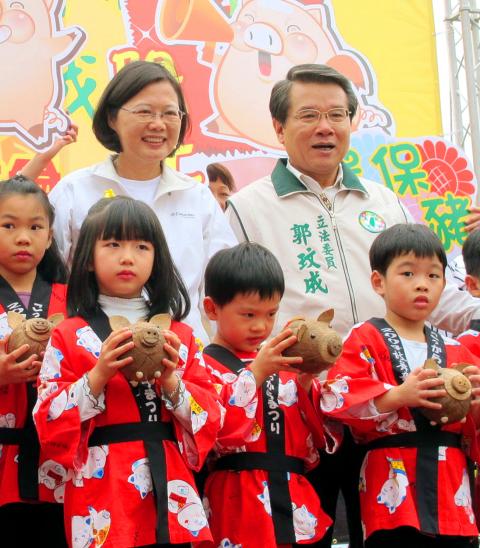By Chris Wang
Staff Reporter
The administration of President Ma Ying-jeou (馬英九) has failed to care for farmers — fruit growers in particular — and it has proven incapable of resolving agricultural supply imbalances and falling produce prices, Democratic Progressive Party (DPP) presidential candidate Tsai Ing-wen (蔡英文) said at a campaign event in Greater Kaohsiung yesterday.

Photo: CNA
Tsai focused on agricultural development during her campaign visit to the south, where she attended nine grand opening ceremonies at campaign headquarters of DPP legislative candidates.
“The DPP is ready with good policies to turn Taiwan’s agricultural development around,” she told supporters in Gangshan (岡山), Greater Kaohsiung.
Tsai said the agricultural industry, particularly in the fruit-growing sector, has experienced serious supply and demand imbalances, which has led to falling prices over the past three years, adding that the trade deficit for Taiwanese fruit increased by NT$240 million (US$7.9 million) between 2007 and last year.
“The current situation shows that the government is not doing its job — and probably doesn’t know how to get the job done,” Tsai said, adding that Ma “reads the data of his public opinion polls more carefully than economic data.”
Tsai said the DPP has raised these issues with the government, but was given the cold shoulder by the Ma administration, which subsequently used the topic to attack her campaign, saying that she was using incorrect statistics to mislead the public.
Statistics provided by the DPP showed the price of second-grade bananas in Nantou County fell to NT$2 per 600g, but they cost farmers NT$16 per 600g to produce.
This was the second time since June that prices had fallen to such drastic lows, the DPP said.
Similar plunges have also been seen in the price of guavas in Changhua, longans in Greater Taichung and Nantou, persimmons in Taitung, as well as tangerines in Yunlin, the party said.
Ma has denied the price drops by citing wholesale and retail prices, rather than local prices, which is the price that actually relates to farmers’ income, Tsai said.
If elected in January, Tsai said, she would have the government agencies in charge of agricultural affairs monitor production and produce prices at all times, and help market the nation’s agricultural produce overseas.
She also proposed establishing a NT$100 billion agricultural development fund to modernize the sector and encourage younger people to work in the industry.
The Ma administration’s inability to resolve local economic woes has been a great concern, she added.
Tsai said the economic situation in October is typically better than previous months, but the industrial output slowed and the unemployment rates instead rose last month.

MAKING WAVES: China’s maritime militia could become a nontraditional threat in war, clogging up shipping lanes to prevent US or Japanese intervention, a report said About 1,900 Chinese ships flying flags of convenience and fishing vessels that participated in China’s military exercises around Taiwan last month and in January have been listed for monitoring, Coast Guard Administration (CGA) Deputy Director-General Hsieh Ching-chin (謝慶欽) said yesterday. Following amendments to the Commercial Port Act (商港法) and the Law of Ships (船舶法) last month, the CGA can designate possible berthing areas or deny ports of call for vessels suspected of loitering around areas where undersea cables can be accessed, Oceans Affairs Council Minister Kuan Bi-ling (管碧玲) said. The list of suspected ships, originally 300, had risen to about 1,900 as

Japan’s strategic alliance with the US would collapse if Tokyo were to turn away from a conflict in Taiwan, Japanese Prime Minister Sanae Takaichi said yesterday, but distanced herself from previous comments that suggested a possible military response in such an event. Takaichi expressed her latest views on a nationally broadcast TV program late on Monday, where an opposition party leader criticized her for igniting tensions with China with the earlier remarks. Ties between Japan and China have sunk to the worst level in years after Takaichi said in November that a hypothetical Chinese attack on Taiwan could bring about a Japanese

MORE RESPONSIBILITY: Draftees would be expected to fight alongside professional soldiers, likely requiring the transformation of some training brigades into combat units The armed forces are to start incorporating new conscripts into combined arms brigades this year to enhance combat readiness, the Executive Yuan’s latest policy report said. The new policy would affect Taiwanese men entering the military for their compulsory service, which was extended to one year under reforms by then-president Tsai Ing-wen (蔡英文) in 2022. The conscripts would be trained to operate machine guns, uncrewed aerial vehicles, anti-tank guided missile launchers and Stinger air defense systems, the report said, adding that the basic training would be lengthened to eight weeks. After basic training, conscripts would be sorted into infantry battalions that would take

DEEP-STRIKE CAPABILITY: The scenario simulated a PLA drill that turned into an assault on Taiwan’s critical infrastructure, with the launchers providing fire support Taiwan yesterday conducted this year’s first military exercises at Longsiang Base in Taichung, demonstrating the newly acquired High Mobility Artillery Rocket System’s (HIMARS) ability to provide fire support and deep-strike capabilities. The scenario simulated an attack on Penghu County, with HIMARS trucks immediately rolling into designated launch areas and firing barrages at the Wangan (望安) and Cimei (七美) islands, simulating the provision of fire support against invading forces. The HIMARS are supposed to “fire and leave,” which would significantly increase personnel and equipment survivability, a military official said. The drill simulated an exercise launched by the Chinese People’s Liberation Army (PLA) Eastern